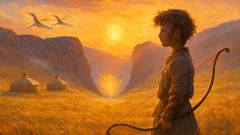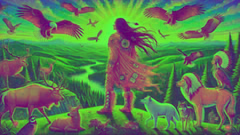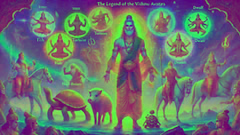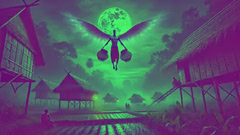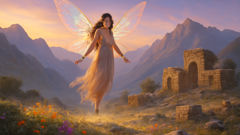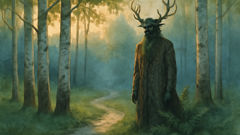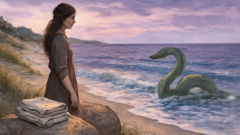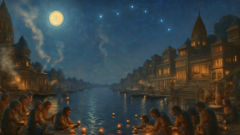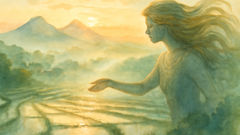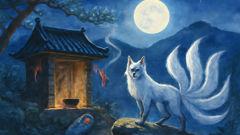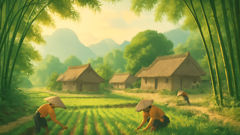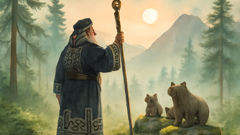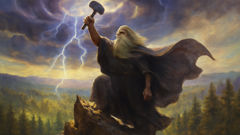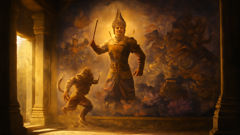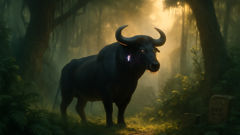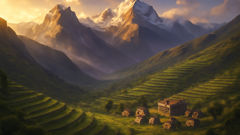Introduction
The sun rose like a copper coin over the Mongolian steppe, its edge pressed thin by distance and wind. Light unrolled across river and grass, catching on the freckles of sheep, the lacquered curve of a morin khuur, the smoke ribboning from felt gers as if the hearths themselves were exhaling. Beyond every familiar line—beyond the drum-echo of hooves and the whistle of cranes—lay a hidden valley whose name the wind pronounced as a blessing. The people called it Yesön-Örgöö: Ninefold Enclosure, the Unfading Valley, a place where youth didn’t rush away but flowed in a clear, slow river. There the grass never browned, the milk never curdled, and children’s laughter was a season that never ended. At its heart stood the Tree of Dawn whose trunk shone like polished bone, whose leaves caught dawnlight and held it, like a hand that refuses to let go of warmth. In the first spring after the thaw that never fully arrived, a child rose on his toes at the valley’s edge to see over the low ridge of his future. He’d fashioned a bow from river-bronze hammered thin by a patient blacksmith and strung it with horsehair he’d combed himself. His name—so the elder who cut his umbilical cord had said—would mean speaker of oaths, breaker of lies, and the bright thread between fledgling and falcon. They called him Jangar. He wasn’t tall yet, but he stood as if he’d already been appointed to stand on behalf of something larger than himself. The elders saw it; the horses felt it; the wolves at the valley’s rim judged him with a narrow acceptance. That morning, while the sun minted every blade of grass in gold, the shamaness tapped her drum and sang softly of a trouble not yet shaped like a face, of a shadow learning the valley’s name. She said that even a place where youth walked like a companion must pay attention, because eternal things aren’t maintained by accident but by devotion, choice after difficult choice. Everyone listened until their tea cooled. Jangar listened until the future, which had stepped onto the ridge beside him, breathed against his cheek and didn’t leave.
The Unfading Valley and the Child with the Bronze Bow
Toward the year’s turn, a cold arrived that didn’t belong to the weather. The grass rippled the wrong way in the wind. Cranes flew with their reflections trailing behind them as if they were lagging in time. The elders saw black snow—ash that falls like winter and smells like old sorrow—dusting the shoulders of their gers. That night, a rider came to the ridge, tall on a horse that cast no breath. His mask was a goat skull lacquered until it shone, and upon his back rode a shadow with a crown of feathers like knives. He dismounted without snow-squeak, without stirrup-jingle. When he spoke, his voice carried the hush of gullies. “The Vulture King, Khar Jargal, makes a simple offer,” the envoy said. “He will keep your valley in glass, untouched by time, if you will give him the seed at the heart of the Tree of Dawn.” The elders were not fools. They knew that a thing frozen appears youthful only because it is dead. Jangar stepped forward before any elder could speak. “Tell your king,” he said, “that our youth isn’t a coin for trade.” The envoy’s smile collected like frost in the hollows of his mask. “Youth is hunger,” he said. “Hunger remembers where the feast is laid.” When the rider left, the black snow thickened. The Tree of Dawn whispered and, for the first time in a hundred years, one leaf fell.
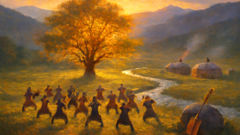
At council, Ekh Tengeriin Uugan, the shamaness with shoulders like a hawk’s perch, beat her drum softly and poured mare’s milk onto the fire. The flames took it thickly and burned sweeter. She sang the oldest answer she knew: that youth returns because it is invited, and that eternal things cannot survive a bargain with fear. “If Khar Jargal cannot crease us with age,” she said, “he will attempt to freeze us into beauty. Beauty without breath is a lid on a jar.” The elders looked to Jangar and his band. They weren’t the tallest, nor the heaviest armored—Tömör’s steel lay mostly in his gaze—but they were threaded to the valley’s breath like string to a kite. The shamaness named two tasks. “To keep our river moving,” she said, “you must bring back the Sun Arrow from the Sky-Well above Khairkhan Mountain. To wake our courage when frost speaks honeyed words, you must raise the Sleeping Drum from the Red Dunes. Go lightly. Return with weight.” When she spoke of weight, Jangar felt the bow in his hand re-balance, as if a new string had been added to it, invisible but tuned to a pitch only the brave could hear.
They left with little ceremony, because ceremony can sometimes be a show put on for doubt. The valley sent them with bread, a wineskin of airag, and a few good jokes Naran volunteered unasked. Saruul, a caravan child with a braid too long for his patience, trailed them from a distance like a curious foal. His father had traded felt for iron with the valley for years and believed in the Tree of Dawn the way some men believe in salt. After the second campfire, Saruul stepped into the light like a truth too honest to stay hidden. “I don’t want to watch from the mountain when the valley freezes,” he said. Gana looked at Jangar and shrugged with the smallest tilt of his chin. The shamaness had once said that fate, like a horse, prefers company. Jangar handed Saruul a spare quiver and said, “Stay behind Alag, and stay ahead of your fear.” The band rode with wind-snapped banners, following the loping line of wolves that often accompany those on necessary quests. They passed ovoo cairns where they tied blue khadag scarves for luck. Above them, the sky stretched like a good bowstring: taut, honest, singing.
The land shifted the way a sleeping animal adjusts to a dream. Grass gave way to stone that offered no moss to grip. They entered the throat of the Whistling Gorge, where every step rang brighter than the last and every call came back wearing a stranger’s coat. At night, the stars rooted themselves so deeply that they felt like pasture posts hammered into the firmament. Od counted them as if they were arrows, losing track only when he blinked and a meteor fell. By the fourth day, frost ghosted their breath even at noon, though the sun burned with the steadiness of a vow. On the ridge above the gorge, they saw it: Khairkhan’s shoulder, blue with age, and, carved into its bone-white crown, a well that held the pooled light of morning. The Sky-Well wasn’t a place so much as a listening—a cupped hand waiting for the first note of a song. Jangar tightened his glove, felt the grain of the bow beneath his thumb, and thought of the single leaf that had fallen while the valley watched. He didn’t promise anyone anything out loud, because some oaths are steadier when spoken to the tendon and the heart.
Trials of Sky and Sand
They descended with legs that trembled the way a deer’s does in grass thick with scent. The air warmed into ordinary labor. The Red Dunes lifted from the horizon like a row of sleeping camels, their backs ripe for mischief. Sand sang beneath the horses’ hooves and got everywhere it could lay a claim. At the dunes’ heart, a crater lay like an emptied bowl. The Sleeping Drum hid there, half-buried, its hide tight as a settled argument. Tarkhan of Dust rose from the crater’s rim with beads for eyes and a smile that promised the pleasure of making someone thirsty. “Return to your valley,” he said, “and I will let your names remain unforgotten.” Jangar had learned by then that most threats dress as gifts. He drew no blade. “We came for what is ours,” he said. Tarkhan sighed—a windless exhalation—and snapped his fingers. From the dunes slid serpents of sand with mouths that chewed dryness and spit despair. The immortal band moved like a flock that had rehearsed migrating together for years. Khulan looped her horse around the largest serpent with a wrist-flick as casual as tossing hair from her eyes; Boro anchored the line with a grunt that sounded like a winter gate opening; Erdene’s arrows stitched the serpent’s open mouth shut. Tömör struck the serpent’s spine with the flat of his hammer, encouraging it to remember the kindness of stillness. Naran, cursing and laughing, distracted a smaller serpent by telling it a story about water that ends as rain in every line. When the last serpent shuddered into mere dune, Gana walked to the crater’s lip and looked down without emotion. “Drums wake if they are remembered,” he said. The band leaned in as one. They beat the rim with their palms, not in battle-rhythm but in the domestic, stubborn cadence people use to roll out dough or slap dust from a rug. The drum answered with a low hill-sound, the tone earth makes when it accepts something back. The crater’s sand settled. The drum rose like a slow moon. Jangar laid his hand upon it and felt an old courage take notice.
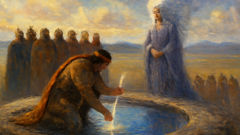
Night fell lazily, the way it does when the day has overpromised. They camped near a salt lick where camels had written their loops in the ground. Saruul fell asleep mid-sentence, his head pillowed on the drum’s rim. The masked envoy returned, his horse newly breathless to mock their living animals. “I see you’ve collected your trinkets,” he said. “The Vulture King offers one last kindness: return now and he will forget that you defied him.” Od laughed once. “Forgetting is a different kind of remembering,” he said, and the envoy’s mouth tightened. He lifted his hand. Between his fingers danced a face Jangar knew: the woman who had wiped smoke from his eyes as a baby, who had braided his hair tight enough to pull his thoughts straighter, who had sung the verse that took him from sleep to life. The envoy’s illusion twisted that face with sorrow as bait. “She will age,” he hissed. “Your valley will age. You can’t outpace the hoofbeat of time.” Jangar closed his eyes, and in the resulting quiet he heard the drum’s skin breathe. He struck it once with the pad of his palm, not to announce war but to call home a thought gone astray. The illusion trembled, then shed its shadow. The envoy snarled. “You will learn to love a statue,” he said, and galloped into a night that did not bother to hold his shape.
They crossed the Glass Steppe, a tract where the ground shines such that everyone sees themselves as older than they are. Every step the band took rendered their reflections wrinkled, stooped, and gray. Bulgan watched her hands become her grandmother’s and said, softly, “I always wanted to know what she saw when she healed me.” Their youth did not slip, but the mirror gave them a practice grief. Jangar stared at his older self and felt a simultaneous ache and relief. He envied the lines because they were proof he’d stayed long enough. Then the mirror-surface flashed back not just the face of age but the faces of choices postponed. He lifted the Sun Arrow and held it toward his reflection not as a threat but as a quill ready to sign. “I accept the years that want me,” he said. The Glass Steppe dimmed. Ahead, the desert loosened its jaw and let them pass. The drum, lashed to a packhorse, hummed occasionally like a deep, contented animal. By the time the dunes exhausted themselves into scrub, the band viewed youth not as a possession but as a conversation they would keep having, with courtesy, for as long as they were permitted to speak.
The Siege of Moonlit Water
Battle began not with a shout but with a collective decision: the valley refused to turn statue. The immortal band moved like water finds hollows—swift, certain, inevitable. Sengiin sang the horses fearless; the notes curved around the enemy like reins. Boro anchored the line again, anchoring more than the line—the resolve of those watching from their doorways. Erdene loosed arrows so quickly that the air forgot how to be empty between twangs. Khulan skimmed the ice’s edge, drawing the black birds’ dive and shaving their shadows short with a blade measured to mercy’s length. Tömör met a phalanx of ice-helmed soldiers and hammered their stubborn quiet into listening. Od counted and counted—his numbers were a promise no one saw but everyone felt, because nothing ran out while he was counting. Bulgan tended the fallen, scavenging warmth from breath, from the hip of a horse, from the memory of summers so plentiful you had to learn restraint. Naran shouted insults that spiraled into jokes, making even the enemy blink, the dangerous blink from which regret sometimes slips out. Khüree’s signals turned a swarm into a flock, and Alag’s eye pried open ambushes before they could close. Shine’s twin blades wrote a treaty of minimal harm where violence had expected an epic; Gana, silent, was where he needed to be before anyone knew they needed him.
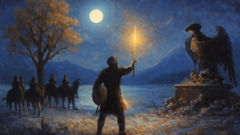
At the lake’s center, the frost thickened into a disk of stubborn cold upon which the Vulture King descended. He wasn’t large. He didn’t need to be. His body carried decisions—so many, so conclusive, that the air had to make space for him. “Come then,” he said to Jangar. “Bring your one arrow.” Jangar stepped onto the ice, which complained in long, sonorous notes. He carried the Sun Arrow not at full draw but across his palm like an olive branch that knows how to fly. Khar Jargal sent at him first not a blade but a sequence of images: Jangar old, Jangar forgotten, Jangar guarding a valley turned museum, each child preserved in a glass jar of light. The ice shone beneath those visions, as if remembering a time before footfalls. Jangar did the only arrogant thing he allowed himself: he bowed. “I won’t defeat you by being younger than you are,” he said. “I’ll defeat you by being as old as I’m meant to be.” He tucked the Sun Arrow under the string and did not release it. Instead, he paused, raised the Sleeping Drum with his left hand, and tapped the skin three times. The sound that rose was the moment a newborn takes first breath and then coughs, realizing breath can hurt. The Vulture King flinched. “Why strike a drum in parley?” he asked. “To remember hunger,” Jangar said, “and the promise that meets it.” He drew then, not at the King’s throat but at the sky. The arrow lifted into the nailed moon, struck the pin that held it, and freed its light. Moon spilled into waves. The lake moaned as if waking from a stiff nap. The ice cracked in a ring that widened with the patience of a lake re-learning its name.
The battle shifted as if someone adjusted the story’s posture. Light found corners where fear had been nesting. Elders stepped out carrying everyday weapons: the long spoon that could knock sense back into a fool, the milk ladle more than capable of drawing mercy from a hard day, the spindle sharp enough to edit a line of fate. Saruul raced messages so efficiently that even Khüree stopped betting against him. The immortal band held the circle; the circle held the valley; the valley held its breath no longer. Khar Jargal, irritated to discover that grandeur loses to stubbornness over time, extended his hand. From his palm unfolded a feather blacker than cave, heavy as an oath broken on purpose. He flicked it at the Tree of Dawn. Jangar sprinted, slipping once, righting with a skid that burned his palms. He did not aim to intercept the feather; he couldn’t. He did the more impossible thing: he planted the Sun Arrow into the earth at the Tree’s roots, not as a spear but as a graft. The arrow melted as if it had been waiting for this. Heat moved upward. The Tree answered by drinking. Sap rose, slow then faster. Leaves that had dulled shook, as if they were listening to a song they loved and had forgotten. The feather reached the trunk, hissed, and evaporated into a rainfall that smelled like dust after thunder.
Khar Jargal stood very still. The illusion of largeness thinned until he was only himself: tired, sharp, fond of control the way some are fond of tea. He didn’t offer surrender; men like him think surrender is a myth told to children. Jangar didn’t kill him. He could have, and the clean simplicity of that would have carved a new scar in the valley that would never heal. He did the other thing, which is always harder. He lifted the drum and struck a rhythm that called vultures when they were still honest birds and asked them to carry away only what the living had finished with. The black birds heard the song’s old instruction. One by one, they peeled from the King’s shadow and returned to the work they had loved before fear bribed them. Khar Jargal’s host loosened, then dissolved. He stared at Jangar with something like curiosity. “You would not destroy me?” he said. Jangar shrugged a little, because sometimes humility needs to be ordinary to be true. “You’re part of the weather,” he said. “We can’t end winter. We make fires and visit each other, and we keep the drum near the door.” The King opened his mouth to speak and found no words that would not make him smaller. He bowed once, which was either a threat postponed or a teacher’s note of attendance, and walked away over water that had become itself again. The nailed moon, now loosened, drifted off its mark and became the moon everyone recognized: beautiful mostly because it didn’t pretend to be more than light.
In the quiet after, Bulgan stitched a cut on Jangar’s palm while he tried not to flinch, and Naran told the kind of joke you tell when you’re grateful for pain because it proves you’re not a statue. The Tree of Dawn glittered, casting coins of gold onto children’s cheeks. The valley exhaled, that long sound a place makes when it remembers how to sleep and how to wake. Saruul sat at the drum and laid his ear against it, solemn as a vow. “It’s still talking,” he whispered. “It always will,” Gana said, and, astonishingly, smiled. The elders didn’t crown Jangar; they offered him tea and a seat slightly off-center of the circle, where those who pay attention often prefer to sit. The immortal band stabled their horses and folded banners with the care you give cloth that has covered both the living and the dead. That night, Jangar stood beneath the moon that was once again free to drift and thought not of victory but of work—gentle, daily labor. He would age, and then he wouldn’t, and then he would, depending on how the valley kept its covenant and how he kept his. Youth would continue to be the week’s best day because someone, every day, would choose it with a hard kindness.
Conclusion
People asked for the tale of that winter until it felt whittled smooth by retelling, yet the story didn’t wear out; it grew easier to lift. The valley remembered that eternal youth isn’t a frozen portrait but a practice: water that keeps moving, laughter that returns after tears, courage that tells the truth even when the truth doesn’t flatter. Jangar led, then stepped aside when others needed to lead; he learned to grant rest and to accept it. The Twelve Radiant guarded the passes and the markets with the same seriousness, because a bargain struck in a bazaar can harm a place as surely as a spearpoint. Saruul, who had watched words travel faster when carried with purpose, became a singer, his voice a road through which listeners could go home. The Tree of Dawn toggled from gold to green and back again with the easy breath of seasons, daring everyone to believe in change without fear. As for Khar Jargal, he wasn’t seen again that year nor the next, but sometimes a feather fell where there were no birds, and the drum thrummed on its own in fine weather. The band took those signs as reminders: winter doesn’t end; it yields. And that was enough. The steppe widened. Hooves stitched the grass with paths that were not scars. In the hush before dawn, Jangar would sometimes lift his bow and draw the empty string, listening to that taut silence only he could hear, a promise strung between now and what must be guarded. It sounded, every time, like a door opening.

